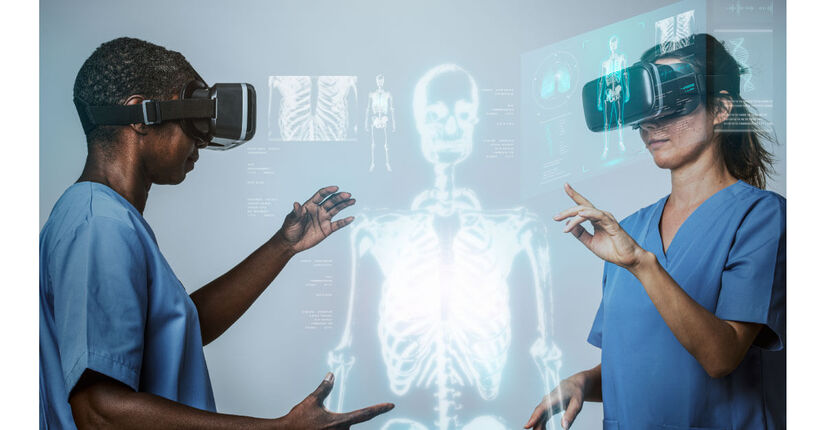Future of VR: Impact on Gaming, Education & Healthcare
Virtual Reality (VR) is no longer a concept of the future; it’s transforming the present. Across various industries, its potential keeps growing. In this blog, we’ll explore the future of VR in three major sectors: gaming, education, and healthcare, highlighting how it promises to revolutionize these fields in ways we never imagined.
Virtual Reality in Gaming
Gaming has always been a leader in adopting new technologies. VR is pushing the boundaries, offering players a deeper level of interaction. No longer are players just spectators of their games; VR places them directly in the action, allowing them to engage with characters and environments in ways never seen before.
The future of VR in gaming looks incredibly exciting. Developers are focused on making VR more accessible, affordable, and comfortable, while also enhancing realism and interactivity. Imagine entering a first-person shooter where your movements and gestures control the gameplay. Or, picture yourself exploring vast landscapes in an open-world adventure, interacting with the environment in real-time. As VR technology improves, gaming will shift from screens and controllers to a fully immersive experience, changing the way we enjoy digital entertainment.
Virtual Reality in Education
VR is revolutionizing education, making learning more dynamic and engaging. Traditionally, classrooms relied on textbooks and static visuals. VR, however, enables students to interact with subjects in real-time, turning abstract concepts into tangible experiences.
Consider a history lesson where students don’t just read about ancient civilizations—they step into ancient Rome or the Pyramids of Egypt. VR can make these subjects come alive. Students can also participate in scientific simulations, explore the human body in 3D, or practice skills in virtual environments before applying them in the real world.
The possibilities for VR in education are endless. It can create customized learning environments for students of different abilities, providing access to previously unavailable experiences. Additionally, VR increases engagement, making learning both enjoyable and more effective.
Virtual Reality in Healthcare
Healthcare is another sector where VR is poised for a major transformation. VR is already helping patients manage pain, reduce anxiety, and more. Its potential, however, extends far beyond therapy.
A key use of VR in healthcare is in training and medical simulations. Doctors and surgeons can practice surgeries in a safe, risk-free environment, gaining experience and confidence. VR also simulates patient conditions, allowing healthcare providers to diagnose and treat more accurately.
In mental health, VR is becoming a valuable tool. Exposure therapy for conditions like PTSD and phobias can now be conducted in controlled virtual environments, giving patients a safe space to confront their fears. VR is also helping people with autism practice social interactions in a structured setting.
Additionally, VR enhances patient rehabilitation. Physical therapy can now be done remotely, with VR guiding patients through exercises and providing real-time feedback. This not only eases the strain on healthcare facilities but also allows patients to receive therapy from the comfort of home, improving outcomes.
The Future Outlook
The future of VR in gaming, education, and healthcare is promising. As VR technology continues to evolve, we can expect more advanced and specialized applications in these fields. In gaming, the goal is to create even more realistic and immersive experiences that blur the line between the digital and physical worlds. In education, VR will provide personalized, accessible learning environments for every student. In healthcare, VR will become an essential tool for training, therapy, and patient care.
As VR hardware, software, and accessibility improve, the possibilities seem limitless. Although challenges remain—such as cost and content availability—the progress so far is promising. As industries fully embrace VR, we will witness a profound transformation in how we experience the world.
Conclusion
The future of VR in gaming, education, and healthcare will create lasting changes that impact both individuals and industries. As VR becomes more accessible and its applications expand, it will continue to evolve. Whether it’s transforming gaming, reshaping education, or revolutionizing healthcare, VR will redefine how we interact with the world.
The question is not whether Virtual Reality will change our lives, but how soon it will become a part of our daily experiences. The future is immersive—and it’s closer than ever before.


0 Comment